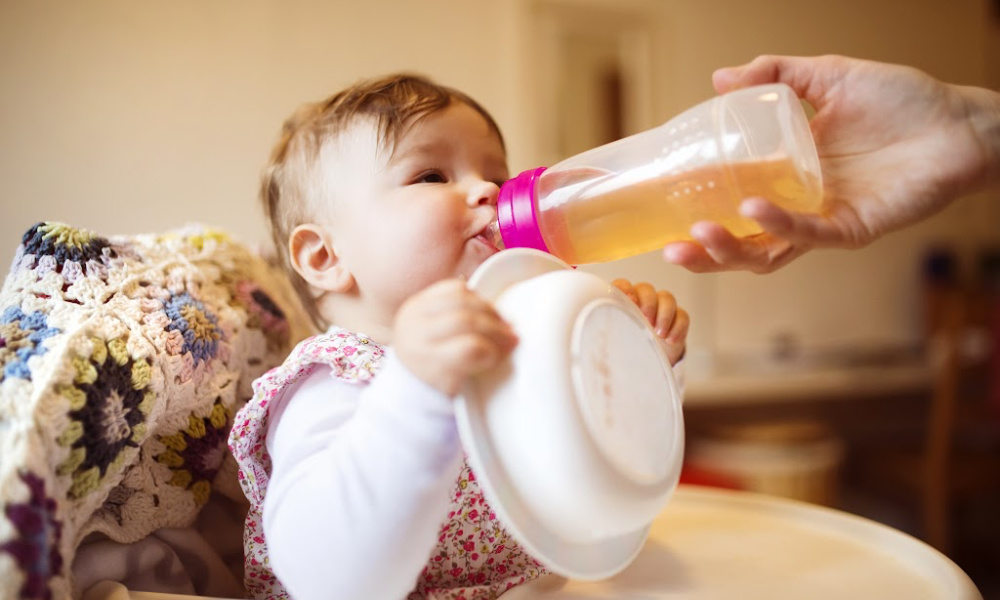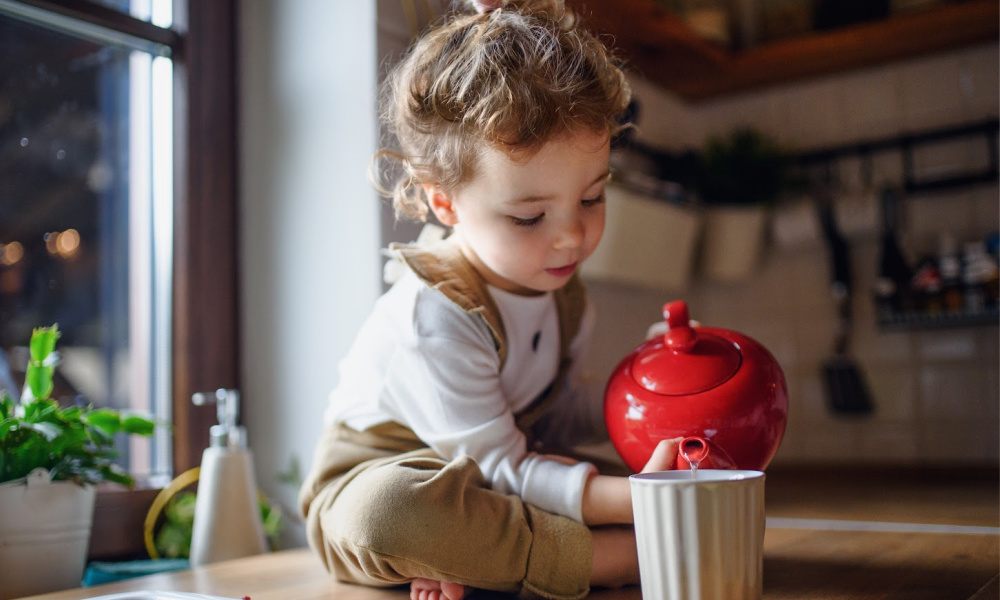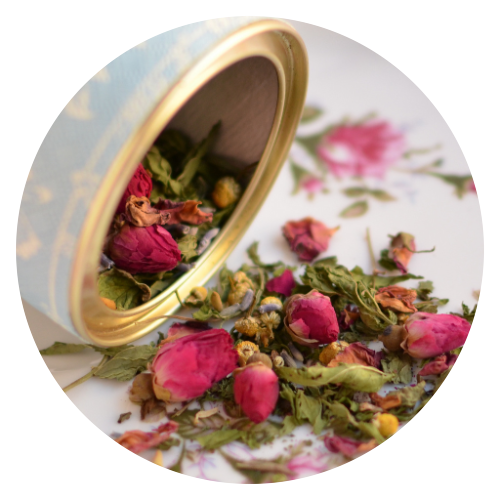Introducing your child to herbal tea early can help them form positive wellness habits. Drinking herbal tea can assist your child in better eating habits, improve hydration, teach them to slow down and take care of themselves, and make them more comfortable with using herbal teas for overall better health.
Considering the many. health benefits of herbal tea, there is little reason to not make the introduction to your child as a part of developing a healthy. lifestyle. Tea has been used for generations for a number of healthful results. It has been used to add nutrients, calm the body and mind, improve metabolism, improve cardiovascular health, help with memory and concentration, improve gut health, maintain healthy blood pressure, prevent more serious illness, and so much more.

Herbal Tea for Babies
When still in the stage before introducing foods outside of breastmilk, babies can benefit from a number of herbs via mother's milk. The Herbal Toad has guidelines as to whether each tea is lactation safe, but when you don't know about any given tea, just avoid it before checking with a licensed healthcare practitioner. Babies who are 6 months and older, who are being introduced to other foods, can try a mild brew of child safe herbal tea added to a cup of water or milk.
Herbal Tea for Toddlers
Offering toddlers can be an excellent way of not allowing them to develop a liking for soda and other sweet beverages. Teaching toddlers that tea can be a tasty and fun beverage is useful for when wanting them to accept herbal remedies when fighting off a virus. Hydrating and replacing lost minerals while addressing symptoms is just some of the reasons I love tea for toddlers. Also, this is the age that children start to play hard and need more to drink in the summer months. I brew up a cup of tea and add ice water and offer it freely throughout the day.
Herbal Tea for Kids
In addition to all the reasons listed for toddlers, sending a diluted cup of tea in the children's water cups for school can hydrate while addressing a need. For nervous children, make a relaxing brew like Sweet Dreams to help with first day jitters. During the fall and winter months, an elderberry tea is an excellent choice to keep their immune system ready to fight the fight. For field day or especially physical taxing days, choose vitamin and mineral rich teas like hibiscus, or something with rosehips. And for nervous belly or other digestive issues, try a mint tea. These are all appealing flavors for children who are adjusting to the tea drinking experience.

Herbal Tea for Teenagers
This is the age where they can start taking charge of their own tea drinking habits. If you started teaching herbs early, sit back and enjoy watching your son or daughter pay attention to what their body is telling them and what herbs they need with still some guidance from you.
If you are new to the world of herbs, this is a wonderful opportunity to reflect the love of learning and spend time with your teen as you learn together. It's never too late! Giving these older kids the tools they need to target what their body needs is priceless, and it is planting those seeds of knowledge that they can draw on for a lifetime for themselves, and their own children one day.

Choosing the Right Teas for Tiny Tastes
When selecting herbal teas for children, prioritize mild, naturally sweet, and caffeine-free options. Always check the ingredients to ensure there are no added sugars or artificial flavors. Here are some kid-approved favorites:
-
Chamomile: Known for its calming properties, perfect for winding down. It has a very mild, apple-like flavor.
-
Peppermint or Spearmint: Refreshing and can be soothing for upset tummies. Ensure it's not too strong for sensitive palates.
-
Rooibos (Red Bush Tea): Naturally sweet and caffeine-free with a pleasant, earthy flavor. High in antioxidants!
-
Fennel: Very mild and often used to aid digestion in infants and children.
-
Ginger (mildly): A hint of fresh ginger tea can add a warming touch, good for a little tummy comfort.
-
Fruit Blends: Many herbal teas are blended with dried fruit pieces (like apple, berry, or peach) which offer natural sweetness and delightful aromas. Look for blends designed specifically for children.
-
Hibiscus: Creates a beautiful vibrant red color and a tart, cranberry-like flavor. Often blended with other fruits.
-
Lemon Verbena: A lovely lemony scent and taste that's bright and refreshing.
-
Dried Lavender (in very small amounts): For a calming, aromatic touch, but use sparingly as the flavor can be strong.
How to Brew Herbal Tea for Children
I suggest steeping the tea for about 5 minutes. This makes a stronger cup of tea, allowing you to add cold water to cool down the tea before giving it to your child. Tea should not be hotter than lukewarm when being served to children. Try avoiding refined sugar to sweeten your child’s tea. Instead, try sweetening your child's brew with a small amount of honey. Do NOT give honey to children under the age of one. Adding tea to a small amount of milk or juice is another way to introduce your child to drinking tea. As they get older, you will find yourself diluting the tea less as they enjoy a stronger cup of tea.
While water is always the best choice, sometimes kids need a little extra encouragement to drink up. That's where a fun, flavorful, and healthy trick comes in: herbal tea ice cubes!
Loose or Bagged Tea
While loose tea is more economical, bagged tea can be more convenient. If you have a little one that is all about doing it themselves, then start with bagged tea. If you are an adventurist mom, why not have a little fun with teaching the children how to brew a proper cup of loose tea?
Note: The herbal teas mentions in this article are generally considered safe for kids, but we always suggest talking to your pediatrician before adding anything to your child's regular diet.



